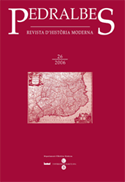Malta i els cavallers hospitalers de l’orde militar de Sant Joan de Jerusalem durant la Guerra de Successió (1702-1714). Notícies extretes de la correspondència diplomàtica
Keywords:
War of the Spanish Succession (1702-1714), Maltese ambassadors, The Order of Saint-John of Jerusalem in the XVIII century, pro-Austrian Catalan nobility, Treaty of Utrecht (1713).Abstract
This paper deals with a hardly known topic: The involvement of Malta as a sovereign state and its aristocracy, the Knights Hospitallers of the Military Order of Saint-John of Jerusalem in the War of the Spanish Succession (1702-1714). Abundant unpublished diplomatic correspondence between Ramon de Perellòs I de Rocafull, Grand Master of the Malta Order and his ambassadors and prominent agents in the courts of Louis XIV in Paris and Carlos III, Archduke of Austria in Barcelona was examined. The letters are kept in the Malta National Library and in the Archives of the Crown of Aragon in Barcelona. The main findings are the following ones: cases of espionage; movement of capital between Barcelona-Genoa-Malta through English middlemen; the doubtful partiality of the Grand Master Perellòs with respect to the two Bourbon kings; the decided complicity in favor of the allied powers from the leaders of the Gran Priorato de Catalunya and Aragon and the Order of Saint-John, occupied by distinguished members of the pro-Austrian Catalan nobility (Sentmenat, Saiol and Vilallonga), although a pro-Bourbonic division between Catalan Knights Hospitallers can be observed; war accounts; and finally, the negotiations of the grand Master Perellòs with Queen Anne of England and the allied powers during the conversations prior to the Utrecht Treaty of 1713. The pro-Austrian Court of Barcelona became Malta’s de facto embassy for the anti-Bourbonic forces in Spain.
Downloads
Published
How to Cite
Issue
Section
License
Copyright (c) 2006 Francesc Amorós i Gonell

This work is licensed under a Creative Commons Attribution-ShareAlike 4.0 International License.
Authors must agree with the following terms:
1. The author keeps authorship rights, ceding the journal the right to first publication.
2. Texts will be disseminated with a Creative Commons Attribution 4.0 International License. Which allows for the work to be shared with third parties, as long as they recognise the work’s authorship, the original publication in the journal and licensing conditions.
This requires acknowledging authorship appropriately, providing a link to the license, and indicating if any changes have been made. It can be indicated in any reasonable way, but not in a manner that suggests the licensor endorses or sponsors the use of the text.
If content is remixed, transformed, or new content is created from the journal's texts, it must be distributed under the same license as the original text



